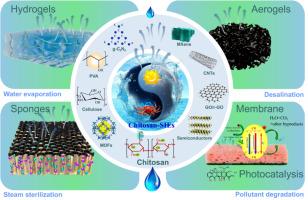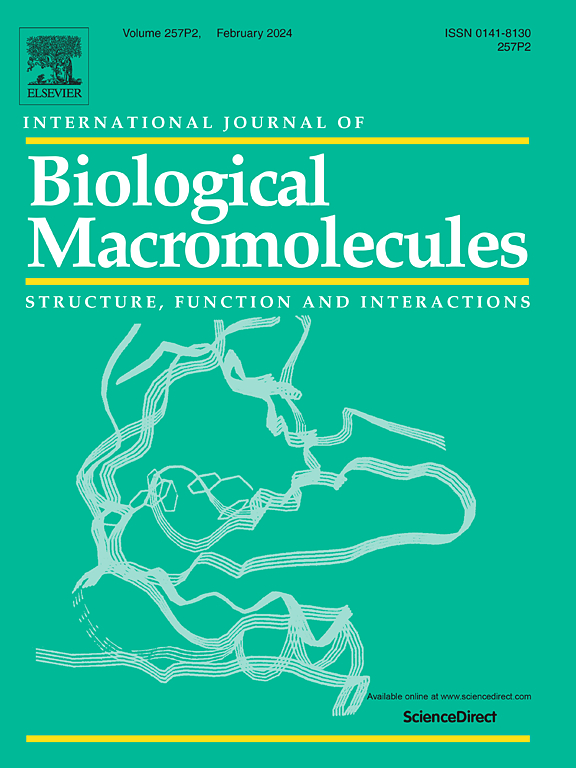Multifunctional and sustainable chitosan-based interfacial materials for effective water evaporation, desalination, and wastewater purification: A review
IF 8.5
1区 化学
Q1 BIOCHEMISTRY & MOLECULAR BIOLOGY
International Journal of Biological Macromolecules
Pub Date : 2025-07-15
DOI:10.1016/j.ijbiomac.2025.145973
引用次数: 0
Abstract
Freshwater scarcity, energy shortage, and water pollution are the three most serious threats to sustainable development. Solar interfacial evaporation technologies have shown great potential for harvesting green solar energy for freshwater production, seawater desalination, and wastewater treatment. Chitosan-based solar interfacial evaporators (CS-SIEs) can realize efficient water evaporation due to their unique properties such as lower vaporization enthalpy, salt resistance, antibacterial properties, and thermal insulation. This review paper summarizes four types of CS-SIEs platforms, including hydrogels, aerogels, sponges and membranes (films). Five types of modified materials used in CS-SIEs are emphasized and summarized, including carbonized chitosan, carbonaceous materials, semiconductors, polymeric and multiple materials. In addition, diversified applications of CS-SIEs are highlighted in water evaporation, desalination, and wastewater purification. Finally, challenges and future prospects are presented to reveal bottlenecks in the applications of CS-SIEs for sustainable water and environmental pollution control engineering. This article aims to provide an overview of the latest development in CS-SIEs and inspire further exploration of novel CS-SIEs with higher efficiency and more versatility to address the limitations of their current research and promote their early industrialization.

壳聚糖基多功能可持续界面材料在水蒸发、海水淡化和废水净化中的应用进展
淡水短缺、能源短缺和水污染是可持续发展面临的三大最严重威胁。太阳能界面蒸发技术在收集绿色太阳能用于淡水生产、海水淡化和废水处理方面显示出巨大的潜力。壳聚糖太阳能界面蒸发器(cs - si)具有蒸发焓低、耐盐、抗菌、保温等特点,可实现高效的水蒸发。本文综述了四种cs - si平台,包括水凝胶、气凝胶、海绵和膜(膜)。重点总结了用于cs - si的五种改性材料,包括碳化壳聚糖、碳质材料、半导体、聚合物和复合材料。此外,cs - si在水蒸发、海水淡化、废水净化等方面的多样化应用也得到了突出体现。最后,提出了cs - si在可持续水与环境污染控制工程中的应用面临的挑战和未来展望。本文旨在对cs - si的最新发展进行综述,以启发人们进一步探索更高效率和更多功能的新型cs - si,以解决其目前研究的局限性,促进其早期产业化。
本文章由计算机程序翻译,如有差异,请以英文原文为准。
求助全文
约1分钟内获得全文
求助全文
来源期刊
CiteScore
13.70
自引率
9.80%
发文量
2728
审稿时长
64 days
期刊介绍:
The International Journal of Biological Macromolecules is a well-established international journal dedicated to research on the chemical and biological aspects of natural macromolecules. Focusing on proteins, macromolecular carbohydrates, glycoproteins, proteoglycans, lignins, biological poly-acids, and nucleic acids, the journal presents the latest findings in molecular structure, properties, biological activities, interactions, modifications, and functional properties. Papers must offer new and novel insights, encompassing related model systems, structural conformational studies, theoretical developments, and analytical techniques. Each paper is required to primarily focus on at least one named biological macromolecule, reflected in the title, abstract, and text.

 求助内容:
求助内容: 应助结果提醒方式:
应助结果提醒方式:


